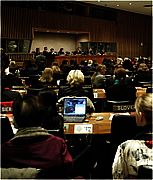Wheeling and Dealing for Asian Seat in the Commission on the Status of Women
» Attempt to Cover Up Defeat in Attempt to Join UN Commission on Human Rights
The Islamic Republic’s announcement for candidacy for membership in the United Nations Commission on the Status of Women (CSW) was announced while membership elections are set for Wednesday. According to a report from a Rooz correspondent, the pervious candidate, Pakistan, retracted its candidacy in favor of Iran. The Rooz correspondent’s report reveals that from Asia, Iran and Thailand had announced their candidacy for membership in the CSW, but at Iran’s request Thailand retracted its candidacy in Iran’s favor. Iran’s membership in the CSW, mainly a symbolic commission, seems definitive at this point. Iran will probably be elected as the commission’s vice chair, currently an empty seat.
The move, condemned by human rights activists as a result of behind-the-scenes wheeling and dealing, has given rise to various reactions. Rooz has examined the various aspects of the issue in interviews with Iran’s women’s rights activists and Hadi Ghaemi.
Nobel Peace laureate Shirin Ebadi regards Iran’s membership in the CSW as unimportant. Noting Iran’s decision to drop its bid to become a member of the United National Human Rights Commission (HRC), she tells Rooz, “To avoid a notorious political defeat, Iran dropped its bid and asked Asian countries to introduce it as a candidate for a seat on the CSW. In reality this was a heavy political defeat for the Iranian government because membership in the CSW is very unimportant.”
Ms. Ebadi explains that unlike the HRC, the CSW does not give the Iranian government any privileges associated. The CSW simply monitors women’s rights issues in other countries without issuing judgments or even statements.
Journalist and human rights activist, Asieh Amini, has a different view. She explains, “In recent years, the Iranian government has attempted to justify its policies with respect to women by sending representatives to international conferences who represent, not Iran’s civil society and women’s movement, but government’s interests. One justification often provided by them for dismissing gender equality is the value of local customs and religious traditions … Therefore, Iran’s membership in the CSW can waste an international opportunity to enhance democracy and gender equality by providing the Iranian government with a forum to defend its fundamentalist policies.”
Amini warns, “This is a warning to women’s groups and movements across the world; even though the CSW has no executive powers, they must prohibit the infiltration of anti-equality ideologies into international institutions.”
However, women’s rights activist Parvin Ardalan argues that Iran’s membership in the CSW can benefit Iran’s women’s rights activist by providing them with an opportunity to criticize Iran’s gender policies on the international stage.
She said, “Instead of simply reaction to this event we can use it to promote gender equality and women’s demands.”
Hadi Ghaemi, executive director of the International Campaign for Human Rights in Iran, believes that Iran is not qualified to serve on the CSW because the country’s gender policies contradict the CSW’s mission.
He says Iran made its bid for membership in the CSW as a result of wheeling and dealing with countries in the region.
He explains, “According to our information Pakistan played a key role in the wheeling and dealing and traded its seat to Iran.”


